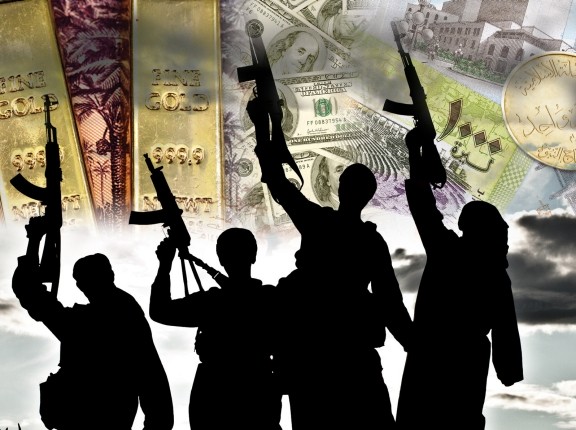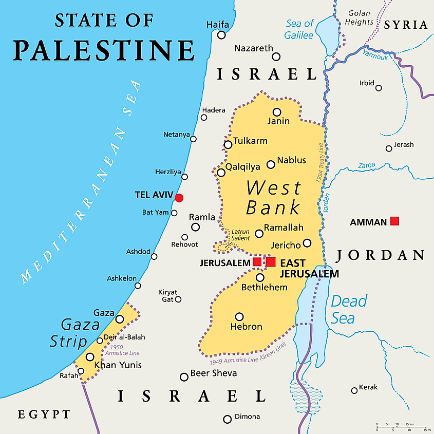AIR SPOTLIGHT
THIRD MINISTERIAL CONFERENCE ON COUNTER-TERRORISM FINANCING

Disclaimer: Copyright infringement not intended.
Context
- Prime Minister Narendra Modi delivered the inaugural address at the Third ‘No Money for Terror’ (NMFT) Ministerial Conference on Counter-Terrorism Financing. Over 70 countries participated in the event.
- The event offers a unique platform for participating nations and organizations to deliberate on the effectiveness of the current international regime on Counter Terrorism Financing as well as the steps required to address emerging challenges.
What is the Third No Money for Terror conference?
- The NMFT started in 2018 as an initiative of the French government which had, in 1989, laid the foundation of the Financial Action Task Force (FATF), the international body at the forefront of combating money laundering and terrorist financing.
- Just like the FATF, which earlier focused only on money laundering but expanded to include terrorist financing after the 9/11 attacks, the continuing activities of the Islamic State and Al Qaeda, despite territorial defeats in Syria-Iraq and Afghanistan respectively, necessitated the NMFT conference.
- In fact, the 2018 event was titled “International conference on combating the financing of Daesh and Al-Qaeda (Paris, 25-26 April 2018).
The Indian experience
- India has largely articulated its “zero tolerance approach” towards terrorism in these conferences and tried to attract the attention to the cross-border terrorism from Pakistan.
- In the 2019 conference, India called for a “united global effort against all those who support terror or help generate finances for terror”. India pointed out how terror groups are active on social media and that undermines any ban the United Nations (UN) might place.
- It called on nations to expedite the finalisation of a Comprehensive Convention on International Terrorism under the UN .
- India also asked the FATF Standards to be effectively enforced. Given its experience of China blocking its push for sanctions against Pakistan-based terror groups and terrorists, it called for UN listings and FATF to not be politicised.
- It also asked the international community to initiate discussion on ‘Countering Financing of Radicalisation (CFR)’, which would prevent radicalization, an essential prerequisite of terrorism.
Highlights of PM’s speech at the Third Ministerial Conference on Counter-Terrorism Financing (2022)
Uprooting Terrorism
- Uprooting terrorism needs a larger, proactive, systemic response. If we want our citizens to be safe, we cannot wait until terror comes to our homes. We must pursue terrorists, break their support networks, and hit their finances.
State-sponsored Terror
- State-sponsored terror is a menace and there is a need to crack down on such forms of proxy war. Organizations and individuals that try to create sympathy for terrorists must also be isolated.
- Certain countries support terrorism as part of their foreign policy. They offer political, ideological and financial support to them... There must be a cost imposed on such countries.
Cooperation in Virtual World
- Today, cooperation is needed not only in the physical world but also in the virtual world too. The infrastructure used for cyber terrorism and online radicalization is distributed. Some also offer weapons training from a remote location and online resources. Communications, and travel, logistics there are many links of the chain in different countries. Each country can and must act against the part of the chain within the reach.
Organized Crime
- One of the sources of terror financing is Organized Crime. Organised crime should not be seen in isolation. These gangs often have deep links with terrorist outfits. The money made in gun-running, drugs, and smuggling is pumped into terrorism. These groups help with logistics and communication too. Action against organized crime is extremely important in the fight against terror. At times, even activities like money laundering and financial crimes have been known to help terror funding. Fighting it needs global collaboration.
Use of Technology
- The dynamics of terrorism are changing. Rapidly advancing technology is both a challenge and a solution. New kinds of technology are being used for terror financing and recruitment. Challenges from the dark net, private currencies, and more are emerging. There is a need for a uniform understanding of new finance technologies. It is also important to involve the private sector in these efforts. From a uniform understanding, a unified system of checks, balances, and regulations can emerge. But we must be careful about one thing. The answer is not to demonize technology. Instead, it is to use technology to track, trace and tackle terrorism.

Terrorism
- Terrorism is the use of unlawful use of force and violence against persons or property to intimidate or coerce a government, the civilian population, or any segment thereof, in furtherance of political or social objectives.
Terrorism in India
- India’s tryst with terrorism and violent extremism can be traced backpartly to the religion-based partition in 1947, which ripped the sub-continent into two nations: India and Pakistan.
- The sub-continent remained witness to the most horrifying ethnic riotsin modern history, which were marked by extreme violence and acts of terrorism.
- Following the partition, after a brief period of neutrality, the then Maharaja of Jammu and Kashmir (J&K), Hari Singh formally acceded to India; however, this act of accession has not, and continues not to be recognised by Pakistan which lays claims to the Muslim majority region.
- This territorial disputelies at the core of the long-standing conflict between the two nations with both nations each vehemently rejecting the other’s claims.
- Further, India views Pakistan as perpetuating the ongoing cross-border conflict and sponsoring militant activity in a bid to destabilise the state of J&K and other parts of the country.
- In addition, considering the number of ongoing insurgencies in India, terrorism and violent extremism is also a manifestation of:
- politico-religious violence
- ethnic-sub regional nationalism
- socio-economic conditions
- politics of identity
- The primary causes of terrorism and insurgencyin India are based on political, religious, ethnic, ideological, identity-driven, linguistic or socio-economic grievances.
- Terrorism in India can be broadly categorised in three distinct parts:
- Cross border terrorism in J&K.
- Terrorism in the hinterland.
- Extreme violence and terrorism as an integral part of the ongoing insurgencies.
The focus of Indian intelligence and investigative agencies has been on five conflict theatres, namely Kashmiri Militancy (KM), Radical Islamic Terrorism (RIT), Pro-Khalistan Extremism (PKE), North-East Insurgencies (NEI) and Left Wing Extremism (LWE).
- India’s richly diverse society provides a fertile ground for terrorismto thrive in many areas:
- politics of communalism and criminalisation.
- fanatic religious movements and irresponsible statements by political and religious leaders.
- human rights excesses.
- marginalized minority communities.
- high levels of youth unemployment.
-
-
- poor governance.
- prolonged delays in criminal justice.
Terror Financing
- Terrorism financing is the provision of funds or providing financial support to individual terrorists or non-state actors.
- The global flow of funds for nefarious purposes has three traditional channels. First, direct smuggling of cash through international borders. Second, the use of hawala networks. Third, banking networks including SWIFT and other international channels. But now, swift technological developments in areas of blockchain or cryptocurrencies which transcend national boundaries and international currency systems have emerged as a new channel for financing terrorist and other illegal activities.
- Terrorist organisations also raise money through several sources like travel agencies, money changers, real estate, retail outlets, NGOs, charitable trusts and even from state sponsors. Terrorists also derive funding from a variety of criminal activities ranging in scale and sophistication from low-level crime to organised fraud or narcotics smuggling or illegal activities in failed states and other safe havens.
- India has borne the brunt of terrorism and has witnessed serious loss of life and property in senseless violent explosions in large cities in the past few decades. The dastardly efforts to radicalise and mislead the youth create a schism in society.

Measures taken to combat Terror Financing
- Most countries have implemented measures to counter-terrorism financing (CTF) often as part of their money laundering laws. Some countries and multinational organizations have created a list of organizations that they regard as terrorist organizations, though there is no consistency as to which organizations are designated as being terrorists by each country.
- The international efforts to tackle the menace of terror financing began way back in 1989 when the Financial Action Task Force (FATF) was formed as a means of bringing order and implementing standards to the monetary system in the world with regard to terror finance and money laundering. However, it was the 2001 terrorist attacks that changed the way security agencies looked at terror financing. The UNSCR resolution 1267 in 1999 and UNSCR resolution 1373 in 2001 formed the bedrock of the financial sanctions regime for terrorist organisations and individuals.
- The Financial Action Task Force on Money Laundering (FATF) has made recommendations to members relating to CTF. It has created a Blacklist and Greylist of countries that have not taken adequate CTF action.
- The FATF blacklist (Call for action nations) only listed two countries for terrorism financing: North Korea and Iran; while the FATF greylist (Other monitored jurisdictions) had 12 countries: Pakistan, Bahamas, Botswana, Cambodia, Ghana, Iceland, Mongolia, Panama, Syria, Trinidad and Tobago, Yemen, and Zimbabwe.
- The Terrorism Prevention Branch (TPB) of the United Nations Office on Drugs and Crime (UNODC) also works on the legal aspects of countering the financing of terrorism.
Decoding FATF
- The Financial Action Task Force is an international watchdog for financial crimes such as money laundering and terror financing.
Establishment
- It was established at the G7 Summit of 1989 in Paristo address loopholes in the global financial system after member countries raised concerns about growing money laundering activities.
- In the aftermath of the 9/11 terror attack on the U.S., FATF also added terror financing as a main focus area. This was later broadened to include restricting the funding of weapons of mass destruction.
Members and meetings
- The FATF currently has 39 members. The decision-making body of the FATF, known as its plenary, meets thrice a year.
- Its meetings are attended by 206 countries of the global network, including members, and observer organizations, such as the World Bank, some offices of the United Nations, and regional development banks.
Mandate
- The FATF sets standards or recommendations for countriesto achieve in order to plug the holes in their financial systems and make them less vulnerable to illegal financial activities.
- It conducts regular peer-reviewed evaluations called Mutual Evaluations (ME) of countriesto check their performance on standards prescribed by it. The reviews are carried out by FATF and FATF-Style Regional Bodies (FSRBs), which then release Mutual Evaluation Reports (MERs).
- For the countries that don't perform well on certain standards, time-bound action plans are drawn up.
- Recommendations for countries range from assessing risks of crimes to setting up legislative, investigative and judicial mechanisms to pursue cases of money laundering and terror funding.
What are FATF’s ‘grey’ and ‘black’ lists?
- While the words ‘grey’ and ‘black’ list do not exist in the official FATF lexicon,they designate countries that need to work on complying with FATF directives and those who are non-compliant, respectively.
- At the end of every plenary meeting, FATF comes out with two lists of countries.
Grey List
- The grey countries are designated as “jurisdictions under increased monitoring”, working with the FATF to counter criminal financial activities. For such countries, the watchdog does not tell other members to carry out due-diligence measures vis-a-vis the listed country but does tell them to consider the risks such countries possess. Currently, 23 countries including Pakistan are on the grey list.
Black List
- For the black list, it means countries designated as ‘high-risk jurisdictions subject to call for action’.
- In this case, the countries have considerable deficiencies in their AML/CFT (anti-money laundering and counter terrorist financing) regimens. Thus, FATF calls on members and non-members to apply enhanced due diligence.
- In the most serious cases, members are told to apply counter-measures such as sanctions on the listed countries. Currently, North Korea and Iran are on the black list.
- Being listed under the FATF’s lists makes it hard for countries to get aid from organizations like the International Monetary Fund (IMF), Asian Development Bank (ADB), and the European Union.It may also affect capital inflows, foreign direct investments, and portfolio flows.
Terrorism Prevention Branch (TPB)
- The Terrorism Prevention Branch (TPB) of the United Nations Office on Drugs and Crime (UNODC) works on the legal aspects of the relevant universal legal documents, countering terrorism financing. T
- his law generally includes a review of internal legislation to ensure that Terrorism Financing (1999) and the appropriate punishment of crimes related to the implementation of these international standards, financing of terrorism and the draft legislation, and to improve the capacity of those concerned to investigate, prosecute and prosecute terrorist financing through specialized training.
How we can further our efforts in curbing terror financing?
- As the world shrinks with technological and communication changes, terrorists, criminals, weapons and funds are also able to move across national boundaries easily. International cooperation between law enforcement authorities in this area is a sine qua non for combating such cross-border challenges.
- In this situation, it is essential for India to take the lead to bolster such efforts.
- Only accurate-linked financial intelligence can reveal the structure of terrorist groups and also the activities of individual terrorists. Of late, such financial intelligence from the private sector has also given significant clues to foil terrorist acts.
- There is a need for better cooperation between financial intelligence units (FIUs) and police in member countries, to encourage the sharing of intelligence and analysis.
- Compliance with Anti-Money Laundering/Combating the Financing of Terrorism legislation requires a multi-layered and coordinated response from financial institutions and government and the degree of compliance will be affected both by the costs of compliance and by the political will to comply.
- An analysis of the modes used by terror financiers in India is essential for security forces, enforcement and intelligence agencies to design processes for prevention, adequate due diligence and standards for investigation.
https://newsonair.gov.in/Talks-and-Current-Affairs-Search.aspx?cat=SN
https://indianexpress.com/article/opinion/columns/how-we-can-further-our-efforts-in-curbing-terror-financing-8270564/
NEWS IN BRIEF: PRELIMS SPECIAL
SARAS AAJEEVIKA MELA, 2022
Context
- Recently, Rural Development Minister Giriraj Singh inaugurated the SARAS AAJEEVIKA MELA, 2022.
Details
- SARAS Mela is an initiative by Deendayal Antayodaya Yojana - National Rural Livelihood Mission to bring the rural women self-help group members in one platform to showcase their skills. It also provides national level exposure to understand the demand and taste of urban customers in metro cities.
Read about DAY-NRLM- https://www.iasgyan.in/daily-current-affairs/day-nrlm
https://newsonair.gov.in/News?title=Rural-Development-Minister-Giriraj-Singh-inaugurates-SARAS-AAJEEVIKA-MELA%2c-2022-at-India-International-Trade-Fair-in-New-Delhi&id=451050
GAZA STRIP
Context
- In Gaza strip, at least 21 people including 10 children have been killed by a fire in a building in a densely populated refugee camp.

Geography
- The Gaza Strip sits between Israel and Egypt.
- Gaza Strip is bordered to the north by the Mediterranean Sea, to the south and east by Israel, and to the west by Egypt.
- The Gaza Strip was created following the first Arab-Israeli war. It is now the site of frequent conflict between Israelis and Palestinians.
https://newsonair.gov.in/News?title=At-least-21-killed-in-fire-at-refugee-camp-in-Gaza-strip&id=451037
UNITED NATIONS HUMAN RIGHTS COUNCIL
Context
- The United Nations Human Rights Council announced that it would hold an urgent session this month on Iran, where a brutal crackdown on mass protests has left hundreds dead.
About UNHRC
https://newsonair.gov.in/News?title=UN-Human-Rights-Council-to-hold-an-urgent-session-on-Iran--protests&id=450867
DIGITAL SHAKTI CAMPAIGN
Context
The National Commission for Women (NCW) launched the fourth phase of Digital Shakti Campaign.
Details
- Digital Shakti was started in 2018 to help women across the nation to raise the awareness level on the digital front, to build resilience, and fight cyber-crime in the most effective ways.
- It is a pan-India project on digitally empowering and skilling women and girls in the cyberspace.
- Through this project, over 3 Lakh women across India have been made aware of cyber safety tips and tricks, reporting & redressal mechanisms, data privacy and usage of technology for their benefits.
- In line with its commitment to create safe spaces for women and girls online, Digital Shakti 4.0 is focused on making women digitally skilled and aware to stand up against any illegal/inappropriate activity online.
https://newsonair.gov.in/News?title=NCW-launches-4th-phase-of-Digital-Shakti-campaign&id=450955





